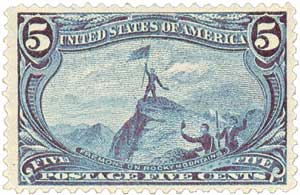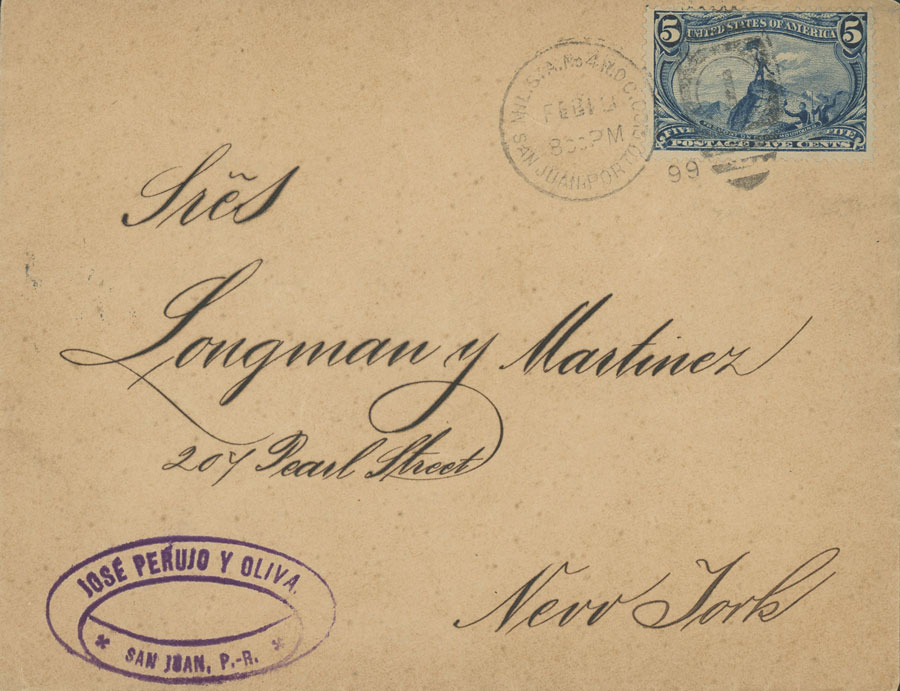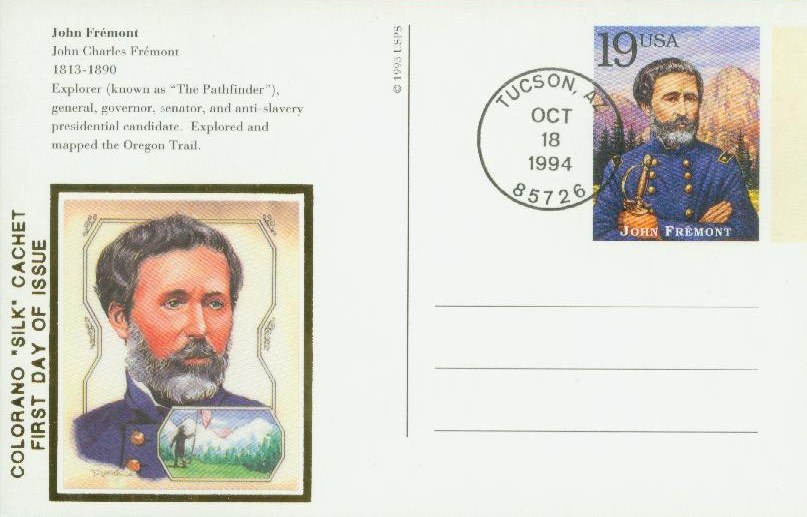
# UX186 FDC - 1994 19c John Fremont Postal Card
John C. Frémont – Explorer
Birth Of Explorer John C. Frémont
As a child, Frémont was described as “precious, handsome, and daring.â€Â After his father died when Frémont was just five years old, a family friend helped to pay for his education. Frémont attended Charleston College, but didn’t graduate despite his talent for math and natural sciences.
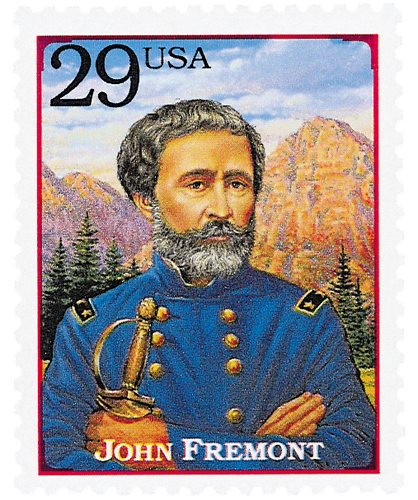
After leaving school in 1831, Frémont took a job teaching math aboard the USS Natchez. He was then made a second lieutenant in the Corps of Topographical Engineers. Between 1838 and 39, he joined Joseph Nicollet on expeditions to the land between the Mississippi and Missouri Rivers.
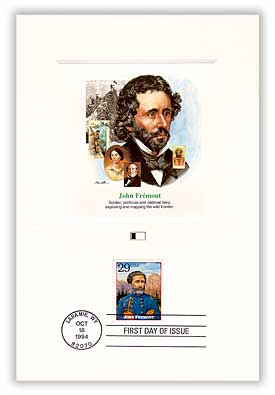
Frémont married Jessie Benton, daughter of Senator Thomas Hart Benton, in 1841. Benton championed the expansionist movement known as Manifest Destiny. Benton and Frémont believed the entire North American continent should belong to the citizens of the US – that it was the nation’s destiny. Benton arranged for Congressional appropriations to fund expeditions to the Oregon Trail, the Great Basin, the Sierra Nevada and California. Using his influence, Benton also arranged for Frémont to lead each expedition.
During these four expeditions, Frémont became known as “The Pathfinder,†exploring the vast territory west of the Mississippi River to the Pacific Ocean. While on his first expedition to Wyoming in 1842, he met frontiersman Christopher “Kit†Carson, who later became his trusted companion and guide.
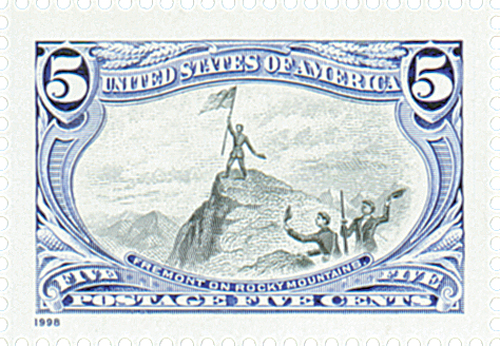
Frémont’s “Report of the Exploring Expedition to the Rocky Mountains†described his adventures and established his reputation as a seasoned explorer. These early travels helped him develop the first scientific map of the American West. Pioneers who dared to head west later traveled on his recorded trails, and were guided by his excellent descriptions.
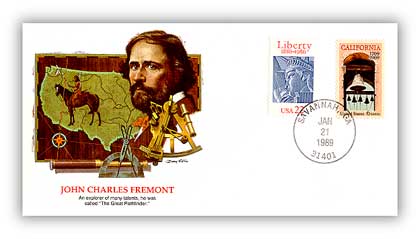
War with Mexico was eminent when Frémont organized his second expedition to California in 1845. Aiding Commodore Robert Stockton and General Stephen Kearny in the conquest of California, he played an important role in the development of our 31st state. Settling there briefly, he gained significant wealth from the gold rush and served as one of the state’s first two senators. In June 1856, Frémont became the first presidential candidate of the newly formed Republican Party. Although he had also been asked to be the Democratic presidential candidate, he refused because the party supported slavery. Fearing that his election would cause the Southern states to secede and possibly lead to a civil war, the Democrats strongly opposed his nomination. Although he carried eleven states, Buchanan, his Democratic rival, carried 19, and Frémont lost the election.
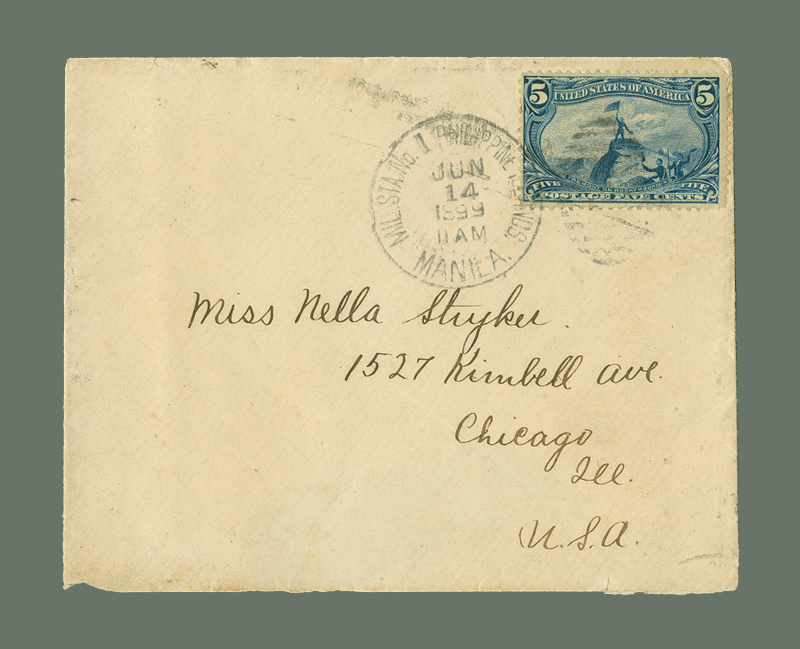
Frémont also served during the Civil War. He was the commander of the Department of the West for five months before being dismissed by President Lincoln. Following the Civil War, Fremont retired from public life to devote himself to finding a possible transcontinental railroad route. In 1878 he was appointed territorial governor of Arizona – a position he held until 1881. He died nine years later in 1890.
Â
John C. Frémont – Explorer
Birth Of Explorer John C. Frémont
As a child, Frémont was described as “precious, handsome, and daring.â€Â After his father died when Frémont was just five years old, a family friend helped to pay for his education. Frémont attended Charleston College, but didn’t graduate despite his talent for math and natural sciences.

After leaving school in 1831, Frémont took a job teaching math aboard the USS Natchez. He was then made a second lieutenant in the Corps of Topographical Engineers. Between 1838 and 39, he joined Joseph Nicollet on expeditions to the land between the Mississippi and Missouri Rivers.

Frémont married Jessie Benton, daughter of Senator Thomas Hart Benton, in 1841. Benton championed the expansionist movement known as Manifest Destiny. Benton and Frémont believed the entire North American continent should belong to the citizens of the US – that it was the nation’s destiny. Benton arranged for Congressional appropriations to fund expeditions to the Oregon Trail, the Great Basin, the Sierra Nevada and California. Using his influence, Benton also arranged for Frémont to lead each expedition.
During these four expeditions, Frémont became known as “The Pathfinder,†exploring the vast territory west of the Mississippi River to the Pacific Ocean. While on his first expedition to Wyoming in 1842, he met frontiersman Christopher “Kit†Carson, who later became his trusted companion and guide.

Frémont’s “Report of the Exploring Expedition to the Rocky Mountains†described his adventures and established his reputation as a seasoned explorer. These early travels helped him develop the first scientific map of the American West. Pioneers who dared to head west later traveled on his recorded trails, and were guided by his excellent descriptions.

War with Mexico was eminent when Frémont organized his second expedition to California in 1845. Aiding Commodore Robert Stockton and General Stephen Kearny in the conquest of California, he played an important role in the development of our 31st state. Settling there briefly, he gained significant wealth from the gold rush and served as one of the state’s first two senators. In June 1856, Frémont became the first presidential candidate of the newly formed Republican Party. Although he had also been asked to be the Democratic presidential candidate, he refused because the party supported slavery. Fearing that his election would cause the Southern states to secede and possibly lead to a civil war, the Democrats strongly opposed his nomination. Although he carried eleven states, Buchanan, his Democratic rival, carried 19, and Frémont lost the election.

Frémont also served during the Civil War. He was the commander of the Department of the West for five months before being dismissed by President Lincoln. Following the Civil War, Fremont retired from public life to devote himself to finding a possible transcontinental railroad route. In 1878 he was appointed territorial governor of Arizona – a position he held until 1881. He died nine years later in 1890.
Â






